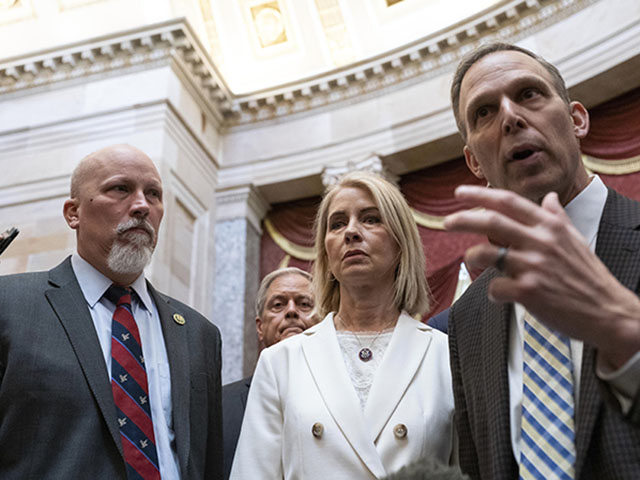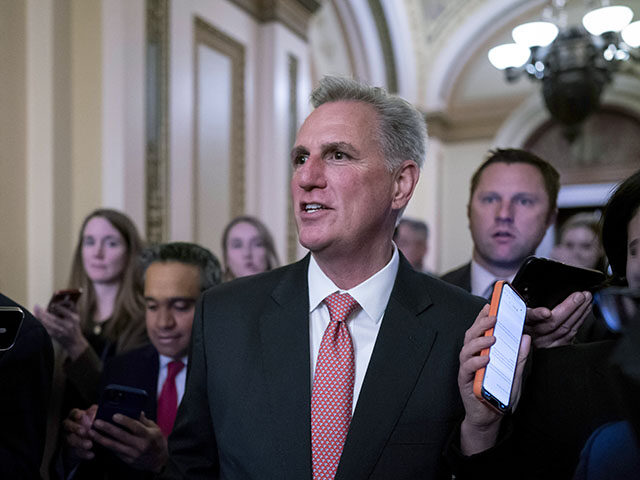The House on Monday adopted rules for the 118th Congress, which comprise agreements made between now-Speaker Kevin McCarthy (R-CA) and his Republican detractors during last week’s historic speaker battle.
The rules package, which includes numerous changes to last Congress’s rules, was passed nearly on party lines, 220–213.
Rep. Tony Gonzales (R-TX) was the lone Republican to join all Democrats in voting against the package.
Changes made to last Congress’s rules are aimed at reducing government spending, increasing legislative transparency, and shifting power away from leadership and toward rank-and-file members.
McCarthy said in a statement following the rules’ passage:
Rules that empower Members to debate and legislate are replacing rules that silenced their voice and centralized power. Rules that increase transparency are replacing rules that kept lawmaking hidden behind closed doors. And rules that reopen Congress to We the People are replacing rules like proxy voting that kept this floor empty.
The rules include keeping net spending under the current level through the next ten years.

Members of the conservative freedom caucus — from left, Rep. Chip Roy (R-TX), Rep. Mary Miller (R-IL), Rep. Scott Perry (R-PA) — talk to reporters in Statuary Hall at the Capitol in Washington, Friday, Jan. 6, 2023. (AP Photo/Jose Luis Magana)
They require a supermajority to vote to pass tax increases, a 72-hour notice on legislation before it can be considered, and a one-member threshold to place a motion to vacate the chair, a rule that had been a point of contention last week as McCarthy’s Republican opposers pushed to lower the threshold from five to one.
The rules exclude the option for members to vote by proxy and limit virtual appearances in committees to witnesses at the discretion of the committee chair. Proxy voting was implemented in response to the Chinese coronavirus in May 2020 but became widely abused by December 2022.
The rules also make several changes to committees, including changing the Committee on Oversight and Reform to the Committee on Oversight and Accountability.
They necessitate the consideration of two committee-related resolutions, one to establish a powerful select subcommittee on the “weaponization of the federal government” to be housed under the Judiciary Committee and one to establish a select committee examining the “strategic competition between the United States and the Chinese Communist Party.”
McCarthy spent weeks negotiating terms of the rules and making other commitments not included in the package in an effort to win over hardline conservatives, most of whom are in the House Freedom Caucus, who had been opposed to voting for him.
The negotiations culminated in an intense four days of back-and-forth last week before enough of the holdouts were convinced to hand McCarthy the gavel. McCarthy ultimately won in the 15th round of voting, the most rounds since before the Civil War.

Rep. Matt Gaetz talks to Rep.Lauren Boebert in the House chamber during the fourth day of elections for speaker of the House, January 6, 2023, in Washington, DC. (Win McNamee/Getty Images)
Freedom Caucus chair Rep. Scott Perry (R-PA) said in a statement about Republicans’ success in passing the rules package that the vote “ratified a historic, transformational agreement to restore the People’s House back to the American People.”
“For the first time in a generation, conservatives have the tools to stop trillions in reckless spending, special interest handouts, secret last-minute deals, and other abusive and irresponsible practices,” Perry stated. “Most importantly, we again have the ability to hold our leadership accountable on their promises to the American People to dismantle the radical Biden agenda.”
By contrast, Rules Committee ranking member Rep. Jim McGovern (D-MA) disapproved of the package, bashing it as “deeply flawed” on the House floor ahead of the vote.
McGovern cited as his top issues in the rules changes to the Ethics Committee, legislation on eliminating taxpayer-funded abortions and exercising appropriate care for babies who survive abortions, the alleged empowerment of “big oil,” and a perceived lack of accountability for wealthy taxpayers.
Write to Ashley Oliver at aoliver@breitbart.com. Follow her on Twitter at @asholiver.

COMMENTS
Please let us know if you're having issues with commenting.